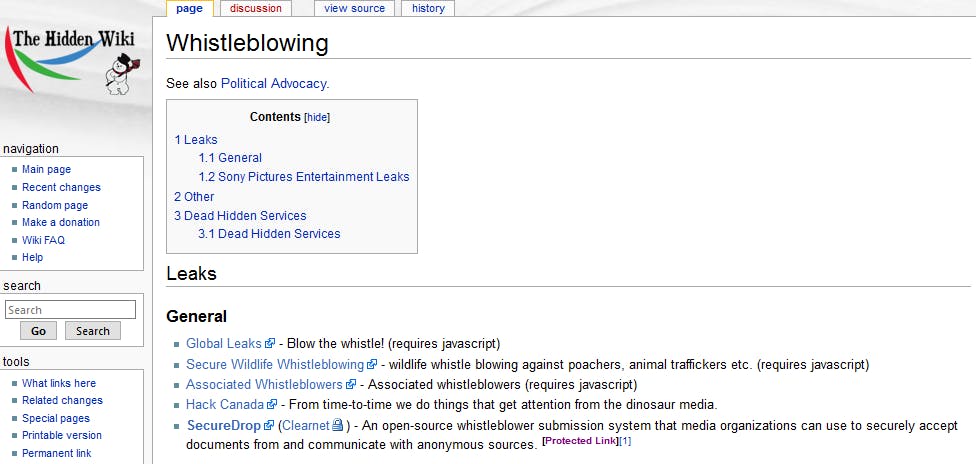It’s not always easy to illuminate the hidden internet.
Much of the dark net remains shadowy, anonymous, and difficult to navigate by design. Standard search engines only reveal a portion of what’s going on. So what are the best ways to find what you’re looking for?
But first, you’ll need to download the Tor browser. If you don’t have it, head over to TorProject.com, download the browser, and install it. If you’ve still got questions about using Tor—the anonymizing software used to connect to the dark net—this video provides a helpful overview.

The first thing you need to know before searching the dark net is you’re in the Wild West of the web. Tor allows you to visit sites that aren’t available on the standard internet, encompassing a wide range of content that includes everything from underground drug markets to child porn. Be aware of the links you click and read search descriptions carefully. If you are haphazard in your browsing, you may find yourself accessing incriminating content. (Also, if you insist of searching for illegal things, make sure you use a VPN for added browser security.)
The second thing you need to know before searching the dark net is most of it is incredibly boring. Expect to find tons of abandoned websites, dead links, and crap as you sift through your search results. Unless you know where you’re looking, expect to do a lot of searching before you find something worth looking at.
Solutions for navigating the dark net (also known as the dark web) have changed over the years as sites rise and fall. But thankfully, it’s never been easier to search the dark net. The search engines are the best they’ve ever been, and more people than ever are using privacy-enhancing technology.
We’ve taken a look at the most popular search engines, wikis, forums, and sources available on the dark net so you won’t have to. Here are the best places to get started searching the dark net.

How to search the dark net
Ahmia.fi: This is your starting point for searching the dark net. Launched with support from the Tor Project, it provides the easiest experience and most precise search results available.
Not Evil: This is the successor to both TorSearch and the Evil Wiki, which were previously two of the best ways to search the Dark Net. Not Evil provides an easy-to-use search engine that drives pretty deep. The search engine’s accuracy is often poor, however, and requires double and triple checking with other sources.
Grams: Grams is the Google of dark net drugs. That comparison extends from the service’s deliberately similar logo and the breadth of results delivered to Grams creators’ penchant for creating new products. If there’s a drug you’ve wondered about finding, Grams is the best way to find it (and then probably get arrested when you have it mailed to your house).
Onion.link: Onion.link is meant to be a link between .onion hidden services and the normal Web. It also hosts a pretty good search engine that can be used in your normal browser.
Google: With proxy tools like Onion.to, Google actually crawls much of the deep web in a roundabout way. Because of its ubiquitous popularity, Google Search is the first tool that almost anyone who hears about the dark net uses to start out. Thankfully, the company’s reputation for incredible search holds up even in the corner of the internet. But if you’re using Tor for privacy, keep in mind Google still tracks what happens here.
DuckDuckGo: Similar to Google but with one significant difference, DuckDuckGo offers anonymous search, a feature in keeping with Tor’s powers of anonymity. It’s no surprise that it’s popular among the Tor crowd.
Torch: An older dark net search engine, Torch has existed for a long time but attracts only a little fanfare.
/r/Onions: Reddit’s 6-year-old Tor community remains a valuable resource to find links, news, and discussion about Tor hidden services.
The Uncensored Hidden Wiki: The Hidden Wiki is a relatively ancient institution, as far as the dark net is concerned. It’s been around for years and has seen an awful lot of links pass through. It remains to this day, however, a bright and easy-to-use flashlight in the dark net. But be warned: It’s easy to stumble across legitimately disturbing and evil content here.
Skunksworked: There’s something to be said for completeness. Skunks lists over 6,500 anonymous websites for your perusal. You can view it by title or by newest site found. There’s no real search function, so it’ll take a little elbow grease and the Ctrl+F function. This is a long list, many sites will be offline, and even more will be scams or fakes. But if you’re up for the hard work of an exhaustive search, this is a weapon you should have in your arsenal.
Now that we know the tools, let’s run some tests and see which service guides us toward the right answer.
Search: “How to be an anonymous whistleblower”
Tor has played a role in several of the most impactful whistleblowing cases of all time, including Edward Snowden’s 2013 mass surveillance revelations. Which search engine can help me find out how to blow the whistle without giving myself away?
Winner: The Hidden Wiki isn’t exhaustive, but for some key areas, it’s unbeaten. The site has an entire section dedicated to whistleblowing, while almost every other resource will send you in loops looking for answers.
Search: “Alphabay”
If you already know the name of a new market, you still need to find the address to reach it. Which search engine can get us where we want to go?
Winner: Google comes through. Lots of search engines can get me a link to AlphaBay itself. But Google delivers such a wealth of information, news, and discussion that the other resources pale in comparison. It’s like the folks at Mountain View have always said: We’ll organize all the world’s information, including how to get super high.
Search: “Hidden service hosting”
What if you want to actually create and host a Tor hidden service? That’s not a simple task for most people—so they’ll often take to search engines in hope of finding answers.
Winner: Google takes the cake again, pointing the way to official Tor instructions as well as solid alternatives (e.g. from an operating system like Whonix).
Search: “Tor Facebook”
Over 1 million people have visited the social network over Tor in a single month, and many did so through Facebook’s anonymous hidden service. Using Facebook’s increasingly popular .onion site, you can beat censorship and maintain better privacy even when using the world’s most popular social network.
Winner: Google and DuckDuckGo, two heavyweight search engines of the normal Web, deliver here with links that point you in exactly the right direction. By the way, you can visit the Facebook onion at facebookcorewwwi.onion.
Search: “Dread Pirate Roberts”
Silk Road’s storied creator had a lasting impact on the anonymous internet. How do you find information on one of the most famous figures to ever hit the dark net?
Winner: Google wins out again, with a stellar collection of news material on Dread Pirate Roberts in their search results.
Search: “Strongbox”
Winner: Google wins out by having a direct link to the New Yorker’s Strongbox tool, which allows anyone to securely tip the publication’s journalists anonymously. Every other engine either sent me to the Evil Wiki or to a page about the Strongbox but not the Strongbox itself.
Overall Winners: When we ran these tests originally, Google and Evil Wiki were the two best search tools out there.
Google retains a top spot by providing some of the most comprehensive results. It’s a bit ironic, given one of the defining features of the dark net that it’s supposed to sit beyond Google’s reach. Even so, Google provides a huge amount of information and even indirect but helpful pointers.
DuckDuckGo is nearly as good and deserves recognition for their efforts, stellar results, and vast improvement over mediocre performance during the last test.
The Hidden Wiki, which is ancient by comparison to many hidden services, is expertly organized. It’s not exhaustive, it’s not definitive, but it’s still the single best starting point all these years later.
Ahmia.fi, Onion.link, and Skunksworld all provide useful tools in their lane, but they’re hit and miss when you’re looking for precision.
Some things never change. The only way to really get to know this side of the internet is to travel it yourself. Be smart, be aware, and avoid illegal activity. Even being a cautious traveler can earn you some valuable knowledge.
Knowing more about Tor and the Dark Net serves a public good. Having these places, processes, and people hidden in shadows means they can and are mythologized and sensationalized. In a time when legislation, law-enforcement action, and political debate is swirling furiously around internet privacy, it’s essential that the public is able to discern fact from fiction. And what better way to do that than exploring for yourself?
Additional reporting by John-Michael Bond
Editor’s note: This article is regularly updated for relevance.




